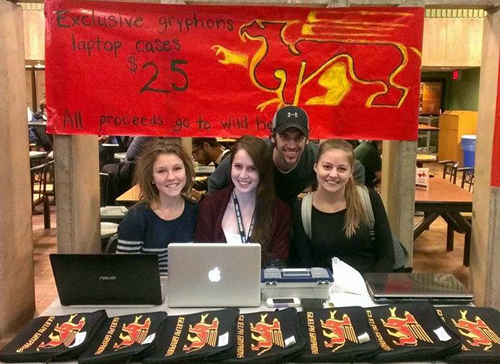
How do you turn one dollar into more than $8,000 in a month? You participate in a charitable initiative called Micro-Tyco, which encourages people to take one dollar and grow it into as much money as they can in one month by selling goods or services. All proceeds go towards micro-loans to support female entrepreneurs in developing countries.
Nine teams of first-year students in Prof. Trent Tucker’s “Introduction to Business” class raised more than $8,000 in November by doing everything from selling handmade products to raffling tickets for a Toronto Maple Leafs game. Although all of the money raised went to charity, the winning team also received $500. Most teams raised between $100 and $150, says Tucker, a professor in the School of Hospitality and Tourism Management (HTM). He also graded the students for their money-making endeavours.
Tucker was looking for a project that would give his students real-world experience. Previously, his students participated in a Dragons’ Den-like competition to pitch a business plan first to their classmates and then to a judging panel. Although that experience taught students how to develop a business plan and use communication skills to try to win over the judges, they weren’t dealing with real money. “It was really a work of fiction,” says Tucker. Micro-Tyco was different, he adds, because “they actually have to execute a plan, and real money changes hands.”
Making money for a good cause was an added bonus. All of the money raised by Micro-Tyco will be distributed as micro-loans in developing countries by Wildhearts, a charity based in Glasgow, Scotland.
The winning U of G team, consisting of second-year accounting student Kevin Pietrobon and first-year bachelor of commerce students Alisha Klepacki, Alexandra Murawska and Sydney Prince, made almost $3,000 by selling laptop sleeves branded with the Gryphon logo. Each student donated some of their own money to purchase supplies.
Giving their profits to charity was “really rewarding,” says Pietrobon. “Anything that goes to a society in need makes you want to be a better person.” He says the team chose to sell laptop sleeves because most students own laptops, and U of G doesn’t currently offer branded laptop protectors.
Learning how to work together as a team was key to their success, says Klepacki. “Thankfully, I was put together with the most hard-working team members who never gave up and faced every day with a positive attitude. Teamwork is what I learned from this unique experience by understanding, communicating and evolving day by day as we faced the crucial realities of not being able to let each other down.”
Tucker says the team also learned important business lessons along the way: “They had to negotiate with the Gryphons to see if they could use their intellectual property. They had to negotiate with the supplier to find out how they could get these [laptop sleeves] for a bulk discount.”
Another team sold raffle tickets to a Leafs game including a limousine ride. How could they afford such an expensive prize with just a dollar? That’s where their networking skills came in. A student’s grandfather had a box in the Air Canada Centre; another student’s father owned a limousine company. Each student chipped in to help cover the cost of the limo rental. The raffle tickets sold for $100, earning the team $1,900.
Another team spent their dollar on rice to fill hand-sewn bags made by a student’s mother and grandmother. The microwaveable bags can be used to relieve muscle tension. They sold the bags at a profit and used the money they earned to buy more rice. “They never went into debt,” says Tucker.
He started his own Micro-Tyco team of HTM faculty. They sold 46 copies of an e-cookbook and earned $150. He wanted to show his students that they didn’t need to limit their business ventures to Guelph, so the faculty found buyers through networking. “We worked our network of contacts.”
In class presentations at the end of the month, each team explained what went well and what didn’t go well with their business plan. “Everybody ran into issues of time management,” says Tucker. Learning from their mistakes produced the most valuable lessons. “I think that’s really where the business learning came from,” he adds. “I wanted them to think about all the problems that come along.”